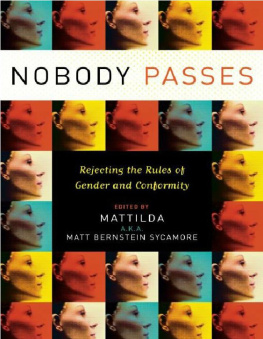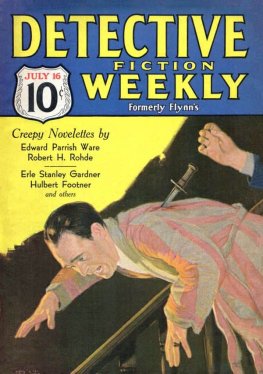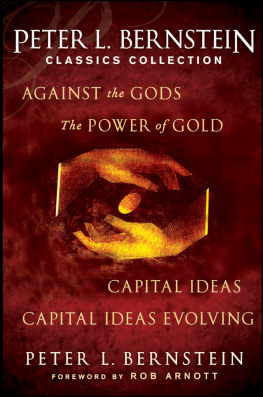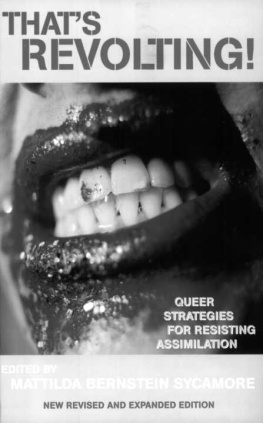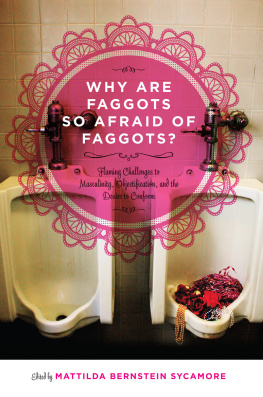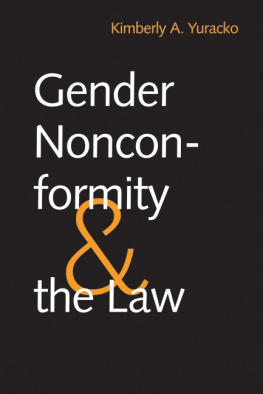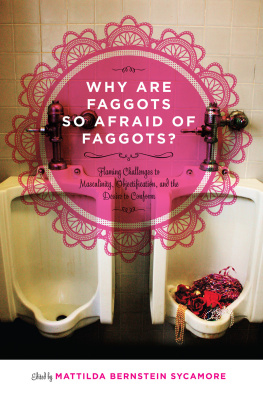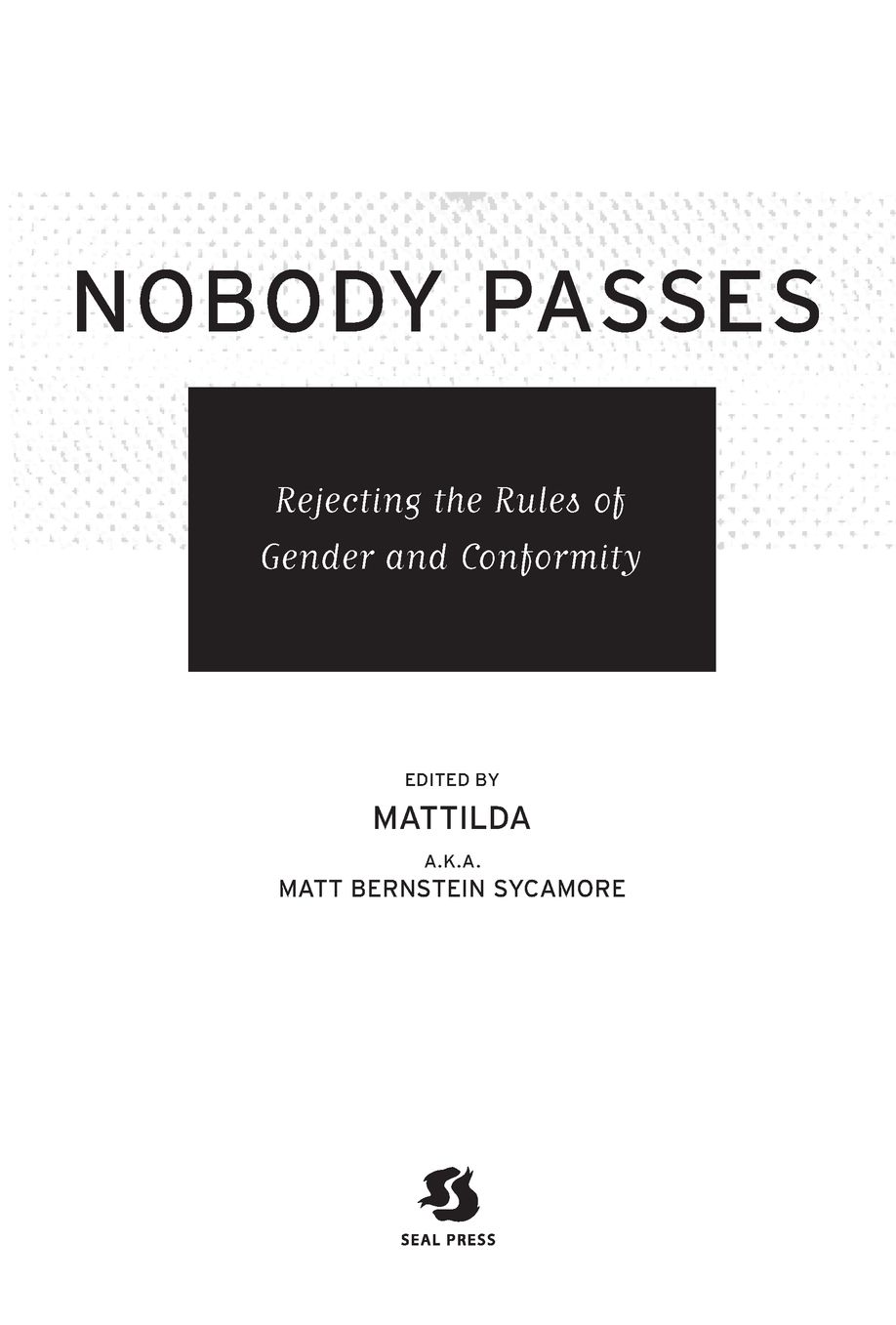Table of Contents
For JoAnne, 1974-1995
REACHING TOO FAR:
An Introduction
MATTILDA, A.K.A.
MATT BERNSTEIN SYCAMORE
Its possible to say that this book began the first time someone called me sissy on the playground (age four). Or maybe it began when my grandmother asked why all my friends were colored (age seven). Or when my parents first abandoned me on a soccer field among unknown monsters of my assigned gender (feels like yesterday). Or maybe this book started when my female friends first developed crushes on the misogynist, queer-bashing boys wed previously hated together (age thirteen). Of course, I could talk endlessly about the ways in which Ive tried to pass, or failed to pass, or refused to pass. But since Im leading you into a book called Nobody Passes, it seems more illuminating for me to start by revealing some of the ways in which Ive passed in order to bring this book to fruition.
In the summer of 2005, I was featured in a Bitch magazine interview titled Free Radical, which centered around my challenges to the tyranny of assimilation, as presented in my last anthology, Thats Revolting! Queer Strategies for Resisting Assimilation. In the interview, I exposed the ways in which members of a privileged gay elite have hijacked the queer struggle, and positioned their desires as everyones needs, reimagining the dominant markers of straight conformity as the ultimate goals of gay success. I reinvoked the radical potential of queer identity to enable everyone to choose their gender, sexual, and social identities, to embrace a radical outsider perspective, and to challenge everything thats sickening about the dominant cultures around us. More readers wrote to me about the Bitch interview than have corresponded about any of my books. People sent entire essays, sharing their own fears and dreams and their ideas for how to fight the cultural erasure that surrounds us.
One of the people who contacted me was Brooke Warner, now my editor at Seal Press, who prefaced her invitation to publish with Seal by saying: Were a womens press, but Im interested in exploring topics of gender-bending. At the time, I was planning to edit an anthology exploring the intersections of assimilation, Jewish identity, and resistance (arising from my own experience, of course). But I quickly shifted gears, and decided to dissect and expose assimilation from a different angle: that of passing. Specifically, I wanted to examine passing as a means through which the violence of assimilation takes place.
I proposed an anthology exploring and critiquing the various systems of power seen (or not seen) in the act of passing. I was speaking of passing in the broadest possible sensepassing as the right gender, race, class, sexuality, age, ability, body type, health status, ethnicityor as a member of the coolest religion, political party, social/educational institution, exercise trend, fashion cult, or sexual practice. In a pass/ fail situation, standards for acceptance may vary, but somebody always gets trampled. I wanted to challenge all standards of authenticity, to confront societal mores and countercultural norms. Instead of policing the borders with pass/fail politics, I was intent on confronting the perilous intersections of identity, categorization, and community in order to challenge the very notion of belonging.
In part, you already know the end result of my correspondence with Brooke (which ruins the suspense factor!), but I think its important to reveal the processin other words, Im attempting not to pass as not-passing. Brooke responded immediately. She was excited about the project, and found it perfectly fitting that I was resisting her desire to create an anthology that wasnt exactly what I wanted.
Then came the first big question: How is this book relevant to women? It now sounds quite quaint, but at the time I was thinking: Are you kidding? You see, in the Bitch interview (as in my life), my politics are firmly situated within feminism (the feminism of challenging power, not accessing power, thank you). I developed a feminist consciousness early, in the process of surviving that good old-fashioned laboratory of patriarchal family violence known colloquially as home. By seventh grade, when my aforementioned female friends became obsessed with the grotesque specimens of brutal manliness theyd formerly despised, I, like many young feminists, decided that all penetrative sex was rape. That didnt stop me from anguishingly hooking up with men in public bathrooms, but I grew into a sexually liberated feminism around radical dykes, fags, activists, and whores dedicated to politicizing every aspect of identity and processing the ramifications of every choicefrom how we ate to who we hated (and dated) to how we fucked (and fucked up).
For the past fifteen years, Ive been involved in creating radical queer challenges to the violence of police brutality, imperialism, gentrification, binary gender tyranny, patriotism, and other forms of social control. This is a radical queer politic with feminism as a foundation for challenging power, demanding accountability, and living defiantly outside the status quo. I always assume that my work is seen in a feminist context, but since I was assigned the label male at birth, Ive been disqualified from feminist authenticity of the surface variety. Thus, I dont immediately fit into Seal Presss tagline: By women. For women.
Which explains another of Brookes questions: Do you have a gender identity, by the way? I will give Brooke credit for daring to contact me in the first place, and for immediately acknowledging the possibility that I might not claim a specific gender identity. She also admitted the absurdity of asking these questions when youre specifically working to break down categorizations. Brooke was preparing to pitch my proposal to the editorial board, so I bit my labia and answered: I identify as a genderqueer faggot and a queen, meaning that Im somewhere on the trans continuum, in the genderblur, gender-bending section. I use female pronouns and identify as femme, but Im not necessarily invested in people seeing me as either male or female. Rather, Id like to create something more delectable and devious.
Guess what? I passed. But not quite to the finish line. I was interested in creating a book that challenged passing in all of its manifestations, but Seal was worried that such an expansive vision would make the book difficult to market, and suggested that I foreground my own history of gender defiance to center my analysis around gender and sexuality. This concern, and the request for a breakdown of contributors using the disastrous categories of men and women (thankfully, this would be impossible), gave me flashbacks of conversations with an earlier publisher about my first two anthologies, Tricks and Treats: Sex Workers Write About Their Clients and Dangerous Families: Queer Writing on Surviving. That publisher had insisted that both anthologies would only be marketable if they centered around male sex workers, or male survivors; I only convinced the publisher otherwise after intense debate. This time, the demands were reversed, but nevertheless the rules of niche-marketed publishing threatened to foil my intentions. What about challenging standards of authenticity, destroying notions of acceptability, and creating new possibilities for defiance? To Brooke, I replied:
While I certainly intend to use gender and sexuality as central lenses through which to view and dismantle the mechanisms of passing, I would not like to limit the project to this framework. Rather, I feel strongly that the book as a whole will be more interesting, politically relevant, and accessibleand inspire a deeper level of understanding and innovationif it takes on all types of passing. Its the refusal to restrict categories of inclusion that opens up the possibility for the most rigorous workwork that skewers all hierarchies and builds something new in the ruins.

